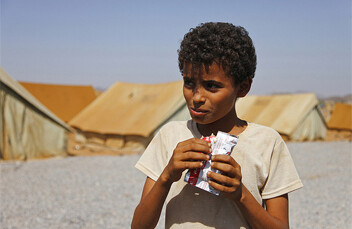Steve Collins has worked in some of the worst famines and wars—Somalia, southern Sudan, Angola, Burundi, Rwanda, (then) Zaire, Liberia, Sierra Leone, and North Korea. During the late 1990s, while in his mid-30s, Collins was running a nutrition program in Liberia. He was an expert in tackling malnutrition by establishing large therapeutic feeding centers where malnourished patients were admitted for an average of 30 days.
His years of experience treating patients led Collins to a breakthrough idea that has changed the landscape of how severe acute malnutrition is treated in the developing world. Collins found that people were drinking contaminated water en route to the feeding centers, or were falling ill to parasites and other diseases within the centers, where mortality rates of 30 percent were routinely recorded. He researched and tested a plan for "community-based therapeutic care" by taking the treatment directly to the sufferers. His new method lowered mortality rates to 4 percent.
The results were initially met with skepticism, but Collins persisted in presenting his case to others in the field until nine years later the United Nations accepted his findings and endorsed his demonstrably better way. The results of his pioneering work were published in the journal Nature.
Scale of the Problem
Every year, more than 10 million children under the age of five die globally, and malnutrition is associated, directly or indirectly, with more than half of these deaths. Chronic undernutrition is the underlying cause for many of the principal child killers including diarrhea, pneumonia, malaria, measles, and AIDS. Malnutrition compromises child immunity such that episodes of illness tend to last longer or be more severe, thus interacting with infection in a vicious cycle.
The World Health Organization cites malnutrition as the single gravest threat to global public health, and nutrition is widely regarded as the most effective form of aid. Because foods such as wheat and soy do not contain a full complement of vitamins and minerals, emergency rations often provide the 40 essential nutrients that are critical for the first 1,000 days of life in sachets of fortified powders, mixed with peanut butter, or directly through supplements.
Shelf life is one advantage of the peanut sachets, and proponents tout that they don't have to be reconstituted with local water, which is often contaminated. But it is also a disadvantage that peanut butter doesn't provide any water and so must be washed down, as anyone who has ever eaten a spoonful can attest. In some cases it may be preferable for an infant to continue breastfeeding so as to receive nutrients and sanitary hydration at the same time.
The economist Amartya Sen has written that famine is almost always a problem of food distribution and poverty, not global food production. In validation of his research, the Food and Agriculture Organization estimates that 80 percent of malnourished children in the developing world live in countries that produce food surpluses. The socioeconomic aspect of the problem is even starker when one considers how much edible food is discarded annually in the West as waste.
Severe acute malnutrition (SAM) is defined as a weight-for-height measurement of 70 percent or less below the median, or three standard deviations or more below the mean reference values posted by the CDC National Center for Health Statistics. A mid-upper-arm circumference of less than 110 mm can be used to measure this in children ages one to five years.
Nearly 20 million children under age five suffer from SAM, and the disorder is associated with 1 to 2 million preventable child deaths per year. Hundreds of millions of other children suffer from chronic malnutrition, which results in stunted development and lifelong negative impacts on earning potential.
The New Silver Bullet?
Ready-to-use therapeutic foods (RUTF) have lately been a subject of discussion in the media. For example, World Nutrition ran a February 2011 feature on "RUTF stuff: Can the children be saved with fortified peanut paste?" The article leads with this thought:
'Therapeutic food' in general is any appropriate food product or products, enhanced nutritionally, and thus made to be more energy-dense and more nutrient-dense. When needed, usually in emergency situations, it should be used in effect as medicine, in conjunction with necessary therapy, for as short a time as possible. 'Ready-to-use therapeutic food' (RUTF) … is a specific type of therapeutic food, now almost always in the form of commercial products, which in the last several years has leapt onto the nutrition scene. It has some special benefits. It is creating new opportunities, new challenges and, in our judgement, an increasing number of new problems.
The World Nutrition editorial discusses what might happen if Big Pharma or Big Snack were to take over and dominate the large, underserved RUTF market. Echoes of Nestlé promoting its infant formula over breast milk certainly haunt the conversation.
Similar concerns were addressed in depth last year in the "The Peanut Solution" in New York Times Magazine. The French company Nutriset currently produces 80 percent of the RUTF market, sold commercially to aid agencies and NGOs. Nutriset produced 14,000 tons of its trademarked Plumpy'nut line of products in 2009 for sales totaling $66 million. Plumpy'nut is mostly manufactured in France and shipped to the developing world, and the company has come under criticism for overzealous patent enforcement when children's lives are at stake.
The Valid Way
Recognizing an opportunity, Collins founded Valid Nutrition in 2005 to make and market his own line of RUTF peanut pastes. The company is set up as a charity and its business model is based on locally grown inputs, as well as local manufacture and delivery. With operating plants in Malawi and Kenya, and a new one coming online in Ethiopia in a few months, Valid is approaching sustainability. Being structured as a registered charity has limited the firm's ability to raise capital, as compared to the for-profit Nutriset, which is well capitalized the old-fashioned way.
Another challenge Valid faces is that peanuts are prone to contamination by aflatoxins and need to meet strict UN guidelines of less than 5 parts per billion, so the company's researchers in Africa are constantly conducting efficacy trials of various combinations of locally grown crops. Valid products are medical doses to treat malnutrition and so must be dispensed by health personnel from a national government, NGO, or other qualified outfit.
While Valid's social enterprise model may differ from the patent-based for-profit approach, Collins believes that major corporations have yet to grasp the full corporate social responsibility potential in preventing malnutrition at the bottom of the pyramid, a market he estimates at $10 billion.
It is worth noting that in October 2010 Nutriset announced that it would extend access to its patent through a "user agreement" in selected African countries.
Collins immediately welcomed this move:
We believe that Nutriset's decision enables increased and meaningful competition for the production of Ready to Use Foods and is an important step forward. Since the global acceptance of the community-based model for the treatment of Severe Acute Malnutrition, developed by our sister organisation Valid International, supported by Concern Worldwide and Irish Aid, worldwide demand for these products has escalated dramatically, outstripping supply. Increasing competition in this vital market will help to increase the availability of these life saving foods to people who need them and reduce the price.
Collins, meanwhile, has entered into an agreement with the innovative for-profit Two Degrees. For every snack bar Two Degrees sells in the West, it purchases a Valid Nutrition sachet and donates it to a malnourished child in Africa, with the doses administered by Partners in Health.
In this manner, Valid Nutrition is bringing some balance and food security to a world facing an unprecedented spike in food prices.




